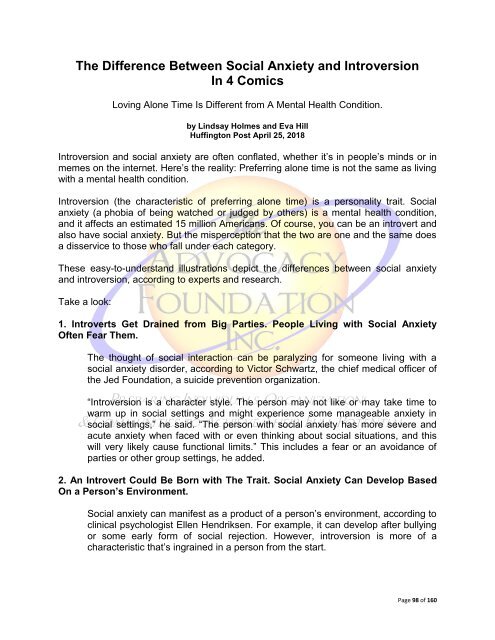The Gift of Introversion
The Gift of Introversion
The Gift of Introversion
Create successful ePaper yourself
Turn your PDF publications into a flip-book with our unique Google optimized e-Paper software.
<strong>The</strong> Difference Between Social Anxiety and <strong>Introversion</strong><br />
In 4 Comics<br />
Loving Alone Time Is Different from A Mental Health Condition.<br />
by Lindsay Holmes and Eva Hill<br />
Huffington Post April 25, 2018<br />
<strong>Introversion</strong> and social anxiety are <strong>of</strong>ten conflated, whether it’s in people’s minds or in<br />
memes on the internet. Here’s the reality: Preferring alone time is not the same as living<br />
with a mental health condition.<br />
<strong>Introversion</strong> (the characteristic <strong>of</strong> preferring alone time) is a personality trait. Social<br />
anxiety (a phobia <strong>of</strong> being watched or judged by others) is a mental health condition,<br />
and it affects an estimated 15 million Americans. Of course, you can be an introvert and<br />
also have social anxiety. But the misperception that the two are one and the same does<br />
a disservice to those who fall under each category.<br />
<strong>The</strong>se easy-to-understand illustrations depict the differences between social anxiety<br />
and introversion, according to experts and research.<br />
Take a look:<br />
1. Introverts Get Drained from Big Parties. People Living with Social Anxiety<br />
Often Fear <strong>The</strong>m.<br />
<strong>The</strong> thought <strong>of</strong> social interaction can be paralyzing for someone living with a<br />
social anxiety disorder, according to Victor Schwartz, the chief medical <strong>of</strong>ficer <strong>of</strong><br />
the Jed Foundation, a suicide prevention organization.<br />
“<strong>Introversion</strong> is a character style. <strong>The</strong> person may not like or may take time to<br />
warm up in social settings and might experience some manageable anxiety in<br />
social settings,” he said. “<strong>The</strong> person with social anxiety has more severe and<br />
acute anxiety when faced with or even thinking about social situations, and this<br />
will very likely cause functional limits.” This includes a fear or an avoidance <strong>of</strong><br />
parties or other group settings, he added.<br />
2. An Introvert Could Be Born with <strong>The</strong> Trait. Social Anxiety Can Develop Based<br />
On a Person’s Environment.<br />
Social anxiety can manifest as a product <strong>of</strong> a person’s environment, according to<br />
clinical psychologist Ellen Hendriksen. For example, it can develop after bullying<br />
or some early form <strong>of</strong> social rejection. However, introversion is more <strong>of</strong> a<br />
characteristic that’s ingrained in a person from the start.<br />
Page 98 <strong>of</strong> 160

















